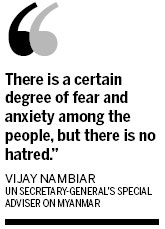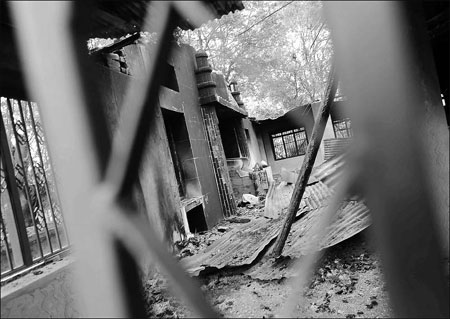Arson, unrest spread in central Myanmar
|
A mosque was nearly burned to the ground in Yamethin, near the Myanmar capital, Naypyidaw, on Saturday as armed Buddhist mobs targeted the Muslim minority. Religious leaders have now begun to advocate for peace, according to Vijay Nambiar, the UN secretary-general's adviser on Myanmar. Soe Than Win / Agence France-Presse |

Scores of people detained after 43 houses, mosque burned on Saturday
Dozens of houses and a mosque have been torched as communal violence spread in central Myanmar, officials said on Sunday, adding that scores of people have been detained over the unrest.
"Altogether 43 houses and a mosque have been burned last night (Saturday). ... Most of the houses belong to Muslims," a ward official in Yamethin town, near the capital Naypyidaw told AFP, adding no one was injured in the unrest.
"This kind of case has never happened here."
The Information Ministry said 52 people were arrested with weapons and 13 held in Meiktila town, where lethal riots last week left at least 32 people dead and thousands displaced.
Police also made more arrests at two other villages as trouble between Buddhists and Muslims spread, the Information Ministry said.
The top UN envoy to Myanmar on Sunday toured a city destroyed in the country's worst explosion of Buddhist-Muslim violence this year, calling on the government to punish those responsible for a tragedy that left dozens of corpses piled in the streets, some of them charred beyond recognition.
Vijay Nambiar, the UN secretary-general's special adviser on Myanmar, also visited some of the nearly 10,000 people driven from their homes after sectarian unrest shook the city of Meiktila for several days this week. Most of the displaced are minority Muslims, who appeared to have suffered the brunt of the violence as armed Buddhist mobs roamed the city.
Nambiar said he was encouraged to learn that some individuals in both communities had bravely helped each other and that religious leaders were now advocating peace. He said the people he spoke to believe the violence "was the work of outsiders", but he gave no details.
"There is a certain degree of fear and anxiety among the people, but there is no hatred," Nambiar said after visiting both groups on Sunday and promising the UN would provide as much help as it can to get the city back on its feet. "They feel a sense of community and that it is a very good thing because they have worked together and lived together."
But he added: "It is important to catch the perpetrators. It is important that they be caught and punished."
Nambiar's visit came one day after the army took control of the city to enforce a tense calm after President Thein Sein ordered a state of emergency.
The bloodshed marked the first sectarian unrest to spread into Myanmar's heartland since two similar episodes rocked western Rakhine state last year. It is the latest challenge to efforts to reform the Southeast Asian country after the long-ruling military ceded power two years ago to a civilian government led by retired army officers.
There are concerns the violence could spread, and the bloodshed has raised questions about the government's failure to rein in anti-Muslim sentiment in a predominantly Buddhist country where even monks have armed themselves and taken advantage of newfound freedoms to stage anti-Muslim rallies.
The clashes are a stark reminder of the challenge which worsening Muslim-Buddhist tensions poses to Myanmar's government as it tries to reform the country after decades of iron-fisted military rule.
AFP-AP
(China Daily 03/25/2013 page11)















